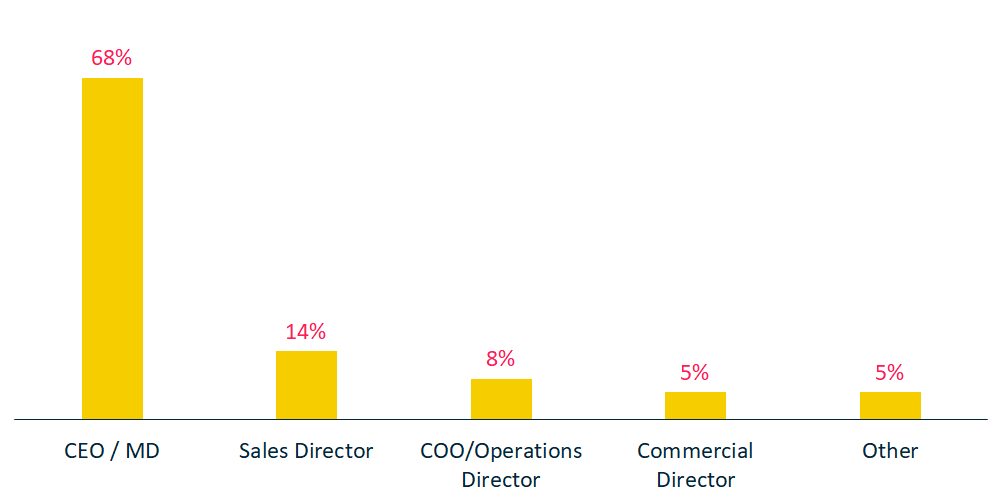
June 24, 2021
Welcome to the penultimate chapter in the Microsoft Partners Insights series.
In this blog we delve into the topic of legal services and speak to the CEO’s of some of the UK’s top Microsoft Partners to get their thoughts.
Contents
- Commercial Lawyers
- Legal Fees
- Subscription vs Ad Hoc Fees
- Types of work
- Intellectual Property
- Improving the Sales Negotiations
- Other Areas of Legal Help
- Negotiating Contracts
Commercial Lawyers
A commercial lawyer will have your business and interests in mind and will ensure that you are legally covered from all aspects prior to entering in to any sort of transaction with a client or supplier. They will be able to identify the potential risks to your business and advise how to negate or minimise them. However not all Microsoft Partners use a lawyer. We sat down for a series of 1-to-1 interviews with a group of senior leaders to find out more. We have used the respondents own words where possible.
We asked the leaders within our group whether or not they used commercial lawyers, for example to negotiate customer and supplier contracts (excluding HR issues).
Does Your Organisation Use Commercial Lawyers?
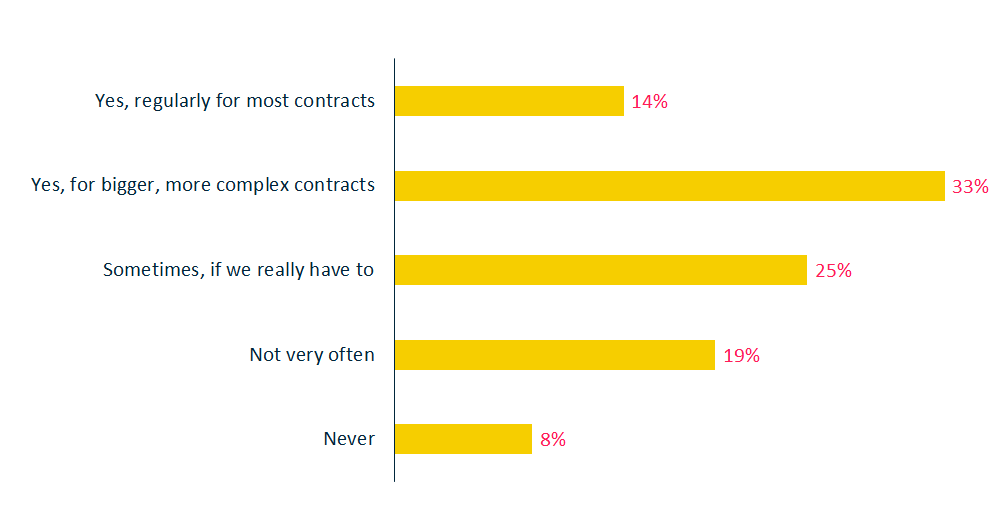
Only 14% on the group said that they use a lawyer on regular basis to handle contractual issues. One third (33%) said they only involve a law firm for either the most complex type of contracts or in instances where the contract value was greater than normal. At the other end of the spectrum it came as somewhat of a surprise to find that just over a quarter of all respondents (27%) either never, or very rarely, use a commercial lawyer.
“It's interesting as a couple of years ago we wouldn't have envisaged spending so much on legal services, but they are worth it - having a high quality legal team is so important.”
“I used to be really wary of legal services but I am converted.”
Legal fees
We couldn’t have a discussion on legal services without talking about legal fees. Part of the reluctance to employ a lawyer often stems from the fact that there is a perception that a client is not getting value for money. Traditionally law firms bill clients for every six minutes of work, which quickly ends up as a hefty legal bill regardless of how complex the work undertaken was. A Lawyers typical response is, “the more time I spend on this, the more thorough I am, therefore the more protected you are”. While this may be true to get the most protection, it is not good for most Microsoft Partner’s bank accounts.
This then leads to selective use of lawyers on bigger contracts or with bigger customers, which accounts for about 58% of the use of lawyers (see chart above). Although this helps Microsoft Partners to reduce their overall legal bill, it leaves them exposed to risk in the contracts and negotiations that they do not use lawyers for. In terms of value for money, we discussed this issue with the group to get their thoughts.
How would you rate the value of hiring a lawyer?
(1 = Good value 5 = Expensive)

Almost two-thirds (61%) of CEO’s felt hiring a lawyer was positive in terms of value (score 1 or 2). Only 9% in total said that it did not represent good value and was expensive (score 4 or 5). The average score for the survey was 2.3, indicating that Microsoft Partners were overall relatively pleased with the value they had received from their legal teams. Several CEO’s in group said that lawyers provide an essential service but did not necessarily represent great value for money.
“Lawyers are expensive but valuable.”
“Essential but hard to say great value!”
“I don't think it's good value for money but it is necessary and provides me with confidence.”
Subscription vs Ad Hoc Fees
Within the group 19% of the companies were employing a legal service provider via a subscription payment package. This new billing model utilises a lower fixed cost monthly retainer which gives the client a pre-determined number of monthly credits/tokens which can then be used against any type of legal work, from a review of an Non-disclosure Agreement (NDA) to the creation of an End-User Licence Agreement (EULA), or even the full services of lawyer to get a complex deal over the line (i.e. multiple rounds of contract review and negotiation). The subscription model also enables companies to easily budget for legal costs in addition to reducing their overall annual legal bill when compared to ad hoc fees.
“Having someone from our legal team on a call is absolute value.”
When sub-categorizing the ‘value’ scores from the bar chart above, to split out those companies that were paying a lower monthly subscription fee versus those that were paying higher one-off ad hoc fees, the results showed a clear trend.
How Would You Rate the Value of Hiring a Lawyer? Subscription vs Ad hoc Payment
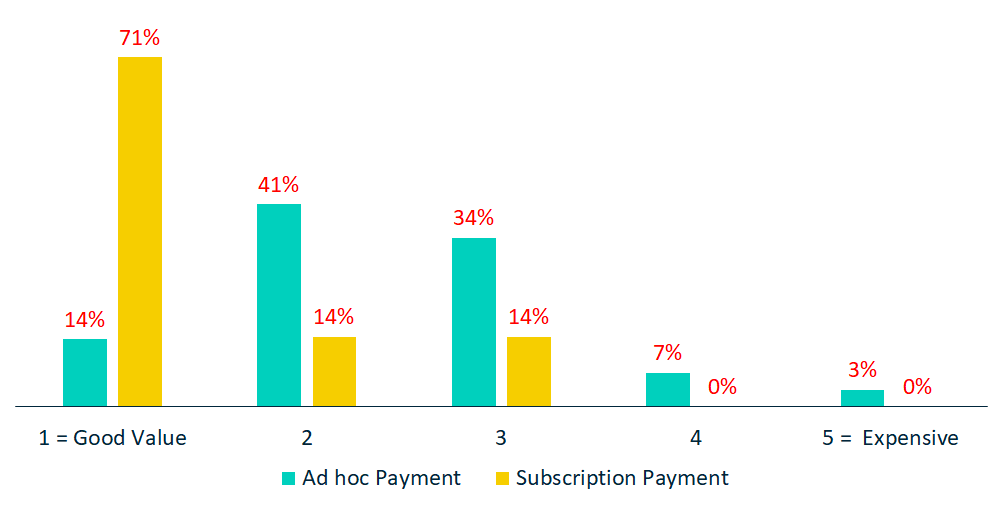
Almost three quarters (71%) of companies with a subscription payment arrangement said it represented ‘good value’ (score = 1), this contrasted to only 14% of companies who pay for legal services on an ad hoc or case-by-case basis. At the opposite end of the scale nobody using a subscription service felt it was expensive or represents poor value (score 4 or 5), compared to 10% of firms paying ad hoc fees who felt it was poor value and expensive. It was interesting to note that the average ‘value’ score amongst the group for subscription clients was 1.4, compared to 2.4 for ad hoc payers (-42% versus subscription).
“We have credits to use each month. They have a fixed price, so it’s in their interest to be efficient.”
We were intrigued to know if the group had a preference on how fees were structured given there has been an increasing shift away from the traditional billing/time methodology to more firms offering fixed pricing.
How would you prefer to have legal fees structured?
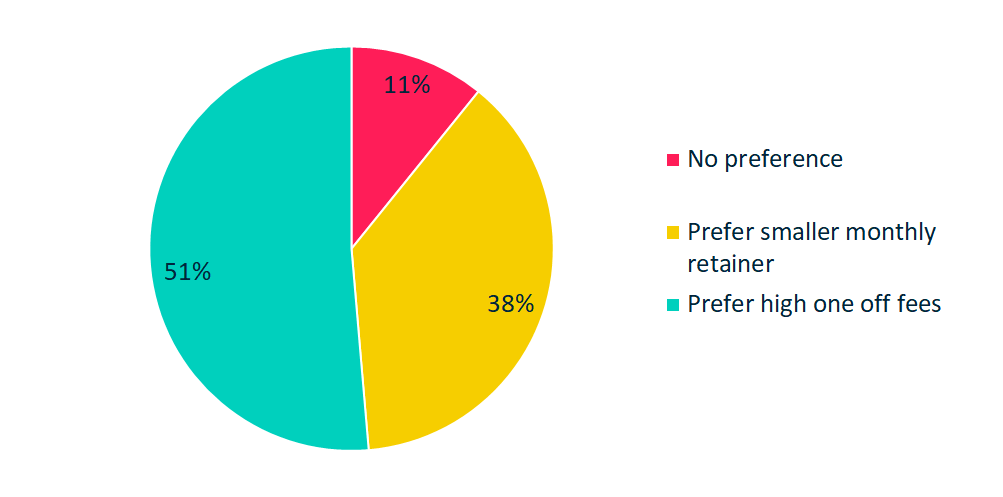
Over half of the leaders (51%) said they would prefer to pay high one off fees (e.g. £5k to £15k per single contract review and negotiation), with just over one third (38%) preferring an option to pay a smaller monthly fixed fee to access legal services every month whenever they needed it. This preference for high one-off fees seemed at odds with some of the ‘value for money’ scores seen in the previous chart when considering that 44% of companies who pay on an ad hoc basis rated them only 3 (average value), 4 (average/poor value) or 5 (expensive, poor value) .
We discussed this point in more detail and the majority of the group who preferred high one off fees were not fully aware of the benefits of subscription pricing.
Types of Work
There was quite a wide spectrum of answers when it came to discussing what work Microsoft Partners hired lawyers to carry out.
Reasons for Using Professional Legal Services
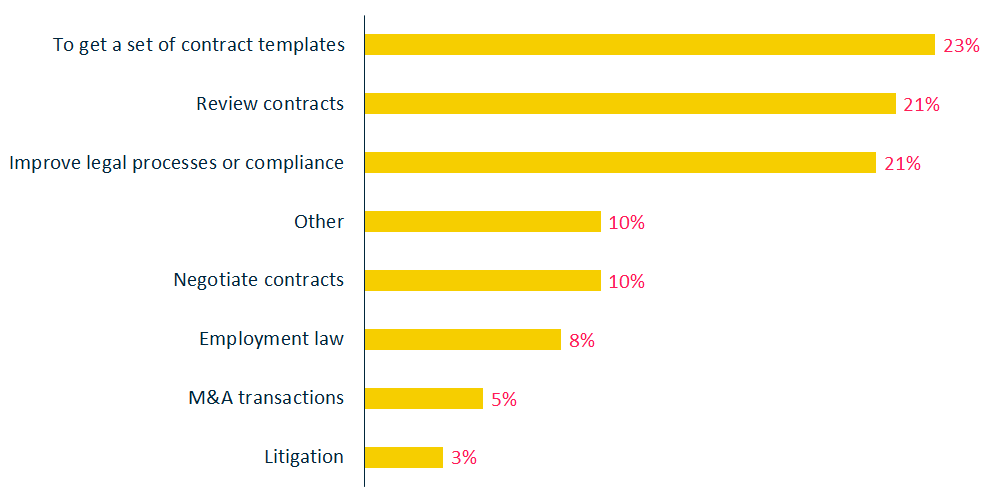
The most popular requirement was without doubt contracts; drafting, negotiating, reviewing, purchasing templates….. it was the single biggest driver of legal support and accounted for over half (54%) of the responses.
“Prior to working with Law 365 We felt our contracts were ok but we thought we should tighten them up.”
“We have our own MSA so we negotiate that ourselves. If it is the customer's contract we send that out for a legal review.”
“We use lawyers to structure initial contracts.”
“What works is the NDA process – turning them around at speed.”
In fact, hiring a lawyer for a contract review in the situation where a Microsoft Partner was using their client’s contract instead of their own was a popular response. This a relatively common occurrence when dealing with enterprise clients who are often able to dictate that their contract template be used.
“I work with big managing agents where I feel like don't have much choice but to accept their terms, so I don’t use lawyers, although maybe I should.”
Intellectual Property
Intellectual Property (IP) rights were also a key area where the many in the group sought advice from lawyers, and for good reason too. Many standard contracts provided by customers that Microsoft Partners are asked to sign stating that the “customer will own all intellectual property including any pre-existing and general know-how”.
This is not ideal for a Microsoft Partner to agree to as typically every Partner has some pre-existing level of IP or knowledge, hence the reason why the client awarded them the business in the first place. However, most IP clauses by default mean that the end customer could end up owning all IP imbedded within the project, even IP the Partner created and owned prior the commencement of the customer’s project. This includes all that ‘know-how’, methodologies employed, or the template used for configuration. Furthermore, it is problematic if the Partner customises software and uses any of their own existing code or modules to speed up the development process, as they are then contractually giving all this up to the customer. This situation can then potentially prohibit the Partner from using it again on future client projects.
The most profitable Microsoft Partners re-use templates, know-how, methodologies, code bases, configuration scripts and even build guides, to increase efficiency and generate high quality outputs. It is therefore in their interests to not give this away to the end customer. IP clauses need to be worded in such a way to protect the Partner, for example, so that the Partner retains at least all pre-existing IP, any ‘know-how’ and general IP used in the creation of any bespoke IP. This allows them to re-use this for other clients.
Improving the Sales Negotiations
Several CEO's felt that their sales teams sometimes “showed naivety” in the contract discussion process with clients, and they valued lawyers for several reasons.
- A lawyer is able to play the ‘bad cop’ role during negotiations with the end client if needed, ensuring the Partner gets a great commercial deal and fair contractual terms, whereas the sales person could sometimes be less worried about contractual terms and could be too accommodating in the negotiations to ensure they won the business and collected their commission.
- With a lawyer undertaking the actual negotiation with the client, this then freed up the CEO from attending the meeting to work on more productive things, safe in the knowledge the deal would be closed properly and there would be no “giving in to last minute demands from the client”.
- They would use a lawyer to provide training and workshops for sales people to help them be better equipped to understand contract terms. Law 365 provide this service to their clients as part of the subscription offering.
Other Areas of Legal Help
There was also a general consensus that “one-off tactical issues” and “things we don't do every single day”, for example understanding new markets or applying for government licenses, were areas where many participants would hire a lawyer. And although most participants were using their legal teams proactively there were instances when they were used in a more reactive way, or as one senior leader put it, they hire lawyers ‘when things go wrong!”.
A small percentage of the of the group we spoke to already had internal legal counsel within their company, however they sometimes use an external legal team to assist with the workload during busy periods or to leverage specialist knowledge in a particular field.
“We use [external lawyers] as an overflow team. We have general counsel.”
“Even though we have an in-house lawyer, they are backlogged, so we use Law 365 as specialists to help our sales team negotiate deals.”
Negotiating Contracts
One of the main reasons given by CEO’s as to why they do not use lawyers was that their companies already had a selection of pre-existing contract templates that would be continually used for new deals.
“We don't accept arbitrary changes and have a standard contract. If we work with a public body we may make an exception.”
"We try and use our standard contract where we can.”
“Tend not to use lawyers. We don't do non-standard contracts.”
“We have a historical base of contracts I use.”
Following on from this point we wanted to know more.
Does your organisation negotiate contracts?
Only 41% of the group said they fully negotiate contracts with their clients and suppliers. It was surprising to learn that almost a quarter of the group (22%) either very rarely or never negotiated contracts. This highlights that many Microsoft Partners are potentially operating with too much contractual risk. In our experience of performing contract audits it is often surprising how much risk is in fact is being carried by companies without realising it. This unnecessary risk is also bad for company valuations as during any company sale process, the buyer conducts a due diligence process of which a key area is legal. When a buyer finds too much risk in the client contracts it can often be used as reason to reduce the offer price.
For the companies who do negotiate contracts the conversation moved on to discussing which person has responsibility for driving those negotiations.
Who negotiates contracts within your organization?
Overwhelmingly it was the CEO/Managing Director who was the point person in the negotiation process. In many cases though the CEO and sales director would work in tandem during this period.
Despite all the contracts being reviewed by those without formal legal knowledge, our data collected from previous surveys showed that 74% of C-suite level leaders in Microsoft Partners described their knowledge of contracts as 'good' or 'excellent'. However delving deeper, of that 74%:
- 15% did not know what an indemnity is.
- 24% did not know what the risks are in limitations of liabilities.
- 35% agree to or do not understand ‘time is of the essence' language.
Do you have a legal question for us?
Whether you are just getting started, need a template package or just some legal advice for your business, we are here to help with any questions you may have.
Our mission is to help you succeed, with less risk.

